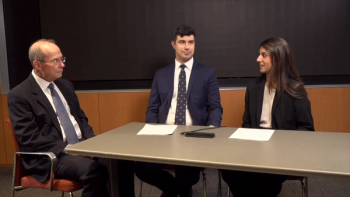
Novel treatment for scarring of the skin shows promise
Transforming growth factor B3 (TGFB3) is instrumental in woundhealing without scar formation. Mark Ferguson, PhD, described aseminal discovery that wounds made in embryos?which have highlevels of TGFB3 and low levels of TGFB1 andTGFB2?heal scar-free.
Transforming growth factor B3 (TGFB3) is instrumental in wound healing without scar formation. Mark Ferguson, PhD, described a seminal discovery that wounds made in embryos - which have high levels of TGFB3 and low levels of TGFB1 and TGFB2 - heal scar-free.
"TGFB3 is a mechanistic pathway to scar-free healing," said Dr. Ferguson, of the University of Manchester, Manchester, United Kingdom.
Dr. Ferguson and colleagues have developed human recombinant TGFB3 as a potential human pharmaceutical for the prevention and reduction of scarring. The drug Juvista (Renovo) has been used in a number of clinical trials. In one study the investigators sought to determine if application of Juvista to an acceptable ("good") scar could improve the scar. Subjects were greater than 60 years old; two 1-cm cuts were made on their arms and they were treated with 5, 50, or 100 ng of Juvista. The drug markedly improved the scars.
In the same type of study in which the drug was applied to improve poor scars, the same results were obtained. The scars treated with 50 ng improved significantly, but not perfectly. Overall in both studies, Juvista provided a 70% response rate and improvement of from 15% to 91% from before the scars were treated, Dr. Ferguson reported.
"The encouraging data generated to date indicated that scarring may not be inevitable after surgery, trauma, or injury and that novel pharmaceuticals may augment the current surgical repertoire," he said. "There is considerable interest in looking at organs other than the skin, such as the eye."
Newsletter
Don’t miss out—get Ophthalmology Times updates on the latest clinical advancements and expert interviews, straight to your inbox.





























